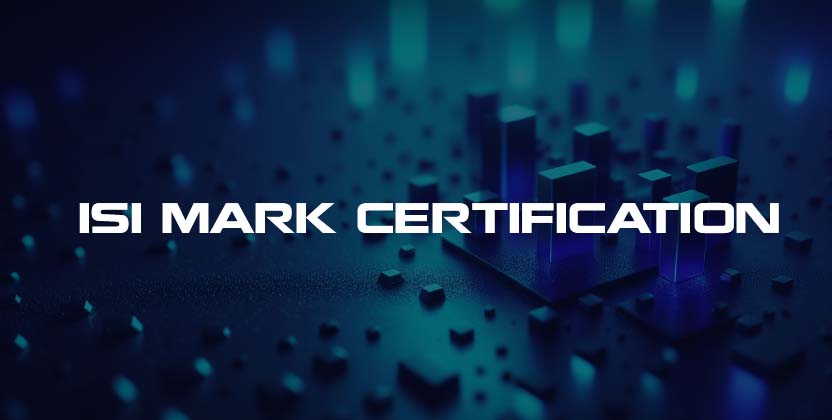Key features of ISI Certification:
• Quality Assurance
• Consumer Trust
• Safety Compliance
• Global Recognition
• Product Excellence
Why ISI Certificate?
BIS Certification (ISI Mark) in India is considered as a mark of trust for the buyers. A BIS Certificate from the Bureau of Indian Standards allows the manufacturers to assure the consumers about product quality, consumer safety, and trustworthiness. BIS Certification Scheme is a voluntary scheme; however, some products are covered under the mandatory certification scheme of BIS.
Minimum Requirements for ISI Certification
To obtain ISI Certification, manufacturers must meet a set of stringent minimum requirements. These requirements ensure product quality, safety, and compliance with Indian Standards and serve as the foundation of a successful certification process.
- Manufacturing Facility:
Ensure your manufacturing facility adheres to the necessary quality control measures outlined in the Indian Standard.
- Testing Facility:
Identify whether you have in-house testing facilities or need to collaborate with external testing labs for specific tests.
- Product Compliance:
Verify that your product complies with the technical specifications and performance criteria specified in the Indian Standard.
- Factory Inspection:
Ensure your facility is ready for a factory inspection
- Testing Equipment Calibration:
Verify that all testing equipment in your facility is properly calibrated and meets the required accuracy standards. This is essential to ensure accuracy
- Record-keeping:
Establish an organized system for record-keeping to maintain product specifications, test results, quality control procedures, and more.
DOCUMENTS Required for ISI Certification
To obtain ISI Certification, manufacturers must meet a set of stringent minimum requirements. These requirements ensure product quality, safety, and compliance with Indian Standards and serve as the foundation of a successful certification process.
- Incorporation Documents
- Address proof of Manufacturing Unit
- Location & Layout Plan for Factories
- Particulars & Test certificate of raw materials
- Flowchart Showing all manufacturing stages(in- house & outsourced)
- Packaging details - Product Size, Quantity, Storage Facility, etc.
- Proof of possession of Manufacturing Premises like lease deed or electricity bill
Note:
1. Incorporation Documents will depend on the type of business structure.
o Companies – Certificate of Incorporation, Memorandum of Association, Article of Association.
o Partnership Firms and LLPs – Partnership Agreements and Certificate of Incorporation, if applicable.
o Sole Proprietorship you can submit Certificate from Directorate of Industries or Certificate from Industry Center, and MSME Certificate (if applicable).
2. If the manufacturing process has been outsourced, an Outsourced Manufacturing Agreement must be submitted.
3. Consent letter’ from BIS recognised Laboratories- It is required where the applicant does not have in-house testing facilities.
Who is authorized to provide an ISI mark?
The ISI mark only be provided by BIS after appropriate review, analysis, documentation, etc. This procedure guarantees that a producer has been adhering to the guidelines and directives established by the BIS.
Validity & Renewal of ISI Certification
The license granted for the first time shall be valid for not less than one year and up to two years. The minimum marking fee shall be paid in advance for the entire duration of validity period. The license to use the ISI mark may be renewed for a further period of one year to five years. An application for renewal of a license to use Standard Mark shall be made before two months of its expiration.
If a renewal application is received after the expiration of the validity. - The renewal of the license may be deferred for a period of up to ninety days
If a renewal application is not received within the period of deferment. - The license shall expire after the date of its validity.
If the renewal application is made after the validity of the license. - The application shall be accompanied by a late fee of Rs.5,000.
If discrepancies led to the license's suspension are not removed - The license shall stand to expire after the date of its validity.
Products Covered Under ISI Certification
ISI Certification Fees
The application and renewal fees for ISI Certification is Rs 1000/- per form. The testing fee, however, will vary from product to product based on the product code. Lastly, the marking fee shall be as specified by the Bureau after the approval of grant of license.
The marking fee for the first year will be unit rate times the quantity marked during the first nine months. The marking fee for subsequent years shall be calculated year-to-year after that. The minimum marking fee shall be paid in advance for the validity period of the license.
If the actual marking fee is more than the minimum marking fee, the difference shall be paid annually by the applicant. The Bureau may direct such licensees to pay actual marking fees quarterly when the production volume is high. In case of cancellation of a license, the marking fee shall not be refunded by the Bureau.
Benefits of ISI Certification
Investing in ISI Certification yields several advantages for manufacturers committed to delivering quality and safety. Beyond meeting regulatory requirements, ISI certification brings forth a spectrum of benefits that extend to businesses, consumers, and the market at large. From bolstering product quality to expanding market reach and enhancing consumer trust, the advantages of ISI Certification are manifold. Let's delve deeper into a few compelling benefits of ISI Certification.
- Enhanced Product Quality
ISI Certification ensures that your products meet the rigorous quality and safety standards set by the Bureau of Indian Standards (BIS). It enhances their overall quality and reliability.
- Market Access
ISI Certification opens doors to a broader market by demonstrating your commitment to producing safe and compliant products. It ensures successful business expansion.
- Legal Compliance
Certification ensures that your products comply with mandatory Indian Standards. This helps you avoid legal and regulatory issues associated with non-compliant products.
- Consumer Confidence
The ISI Mark instills confidence in consumers, signifying that your products are high in quality, safe to use. They meet the prescribed standards set by BIS.
- Competitive Advantage
Certification sets you apart from competitors by showcasing your dedication to quality, ultimately attracting more customers and boosting your brand's reputation.
- Global Recognition
ISI Certification can facilitate international trade by demonstrating that your products meet recognized quality standards. This facilitates easier exports to various countries.
Conclusion
We aid manufacturers in acquiring the ISI Mark for a range of products, such as Aluminum Foils, Safety Glasses, FRK Blending Machines, PVC Insulated Cables, Toys, Helmets, and others falling under the Product Certification Scheme. Our objective is to assist manufacturers in undergoing testing and verification procedures to obtain the ISI Mark in India through the BIS Conformity Assessment Scheme. Throughout this process, we offer valuable assistance and guidance. It's important to note that the Bureau has the authority to revoke the license if any of the license conditions are breached, as outlined in Regulation 11 of the BIS (Conformity Assessment) Regulations, 2018.
 Noida, Delhi NCR
Noida, Delhi NCR
 Mon-Sat : 09:30 AM - 06:00 PM
Mon-Sat : 09:30 AM - 06:00 PM



